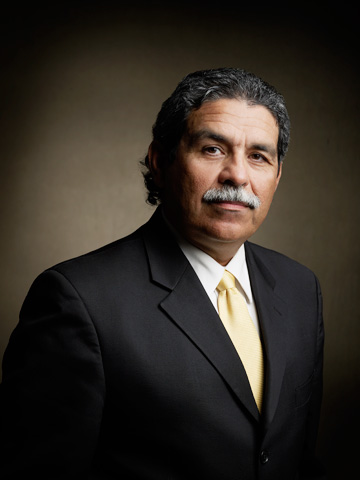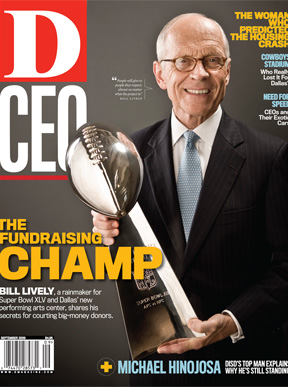There’s no doubt that Michael Hinojosa, ED.D., superintendent of the Dallas Independent School District, has a big, tough job. He oversees a district with a work force of about 20,000 people, a roughly $1.3 billion annual budget, 224 schools, and nearly 160,000 students—85 percent of them economically disadvantaged. We met with him recently to discuss the challenges.
D CEO: How are things are going at DISD?
Michael Hinojosa: I’d like to answer that question three ways. First is the most important—the academic performance of the students. It continues to improve, no matter which way you slice it. The second big item is our budget situation. No money was stolen or missing, but the auditor Deloitte found that we had “control” problems in human resources and business. Those have been rectified. We’ve brought in a new executive chief financial officer, Larry Throm, who has implemented some systems. The third thing is that, because of these issues and the things that have happened, we decided to put an outreach plan together where we went out and reached out to the community. We thought we were going to get beat up and knocked down, but that didn’t happen.
What about that very serious deficit you mentioned, which led to hundreds of layoffs?
We had $120 million in our “fund balance,” or savings account. The last academic year, we overspent that by $59 million. So that cut the fund balance from $120 million to about $61 million. Well, if we [hadn’t changed] the course of history for this year, the potential [deficit] could have been $84 million. But we had people stop spending, and we put controls on our staffing. Now we have our “position control” that is working electronically, and we reduced the overstaffing to get us within our appropriate accounts. Because of those two things, that potential $84 million for the 2008-2009 deficit is now less than $30 million. We think it will probably be $15 million by the end of the fiscal year.
But for the next fiscal year, I hear you’re going to have to borrow $100 million?
Yes. We won’t have a deficit for next year, because a couple of things have happened. [One is,] we got some significant dollars under the federal stimulus … so we’re able to move some things around. [But we also] have to borrow some money—$100 million—because of our payroll. It’s a timing issue. We don’t get [most of our state and local revenues] until January. It’s something the district has done since 2002 or 2003. We go out for a short-term bank loan and pay on that, and that’s why it’s even more important that we build our fund balance back up. It’s going to take us a couple years to get back to over $100 million in our savings account. But next year we’re projecting a $20 million surplus, so we can start [replenishing] the account.
Have you come to grips with the district’s computer software, which was blamed for at least part of the budgeting fiasco?
Absolutely. What we found out was that the Oracle software system was very robust. In the past, the problem was that people customized it to meet their needs or their reports and they overrode it. We’ve unpacked all of that overriding. We’ve found out that it has all the modules we need; we just need to be true to the software.
How are you doing with the student-dropout problem?
The bottom line is we’re making progress, but we have to be careful of the measure. The state used to use an annual dropout rate. Then the state went to what’s called a completion rate: how many kids graduated within five years of the time they entered the ninth grade. Then the feds said that definition isn’t good enough: how many kids graduate in four years? That’s what we’re starting to benchmark and, under that definition, we’re in the mid 60s. But so is Houston; so is San Antonio. This year, we had an increase from 62 to 65 percent, so we know we’re making progress.
You seem to have dodged a lot of bullets here since becoming superintendant. How have you done it?
Well, it’s having a wife that will put up with me. She said that when she married me I was handsome, and I’m not so handsome anymore after getting beat up so much. Part of that is you have to be resilient, and part of that is you have to be in it not for yourself, but for the betterment of the system. In my business, your friends come and go, and your enemies accumulate. Anytime you make a tough decision, someone is going to be upset with you. Also, I’ve matured. When I was a young whippersnapper, I wanted to win every battle and win the war. I’ve learned it’s more important to win the war—and the war is making sure that our students have a fighting chance to be successful.
Do you have any problem with the way the district is covered by The Dallas Morning News?
I think that when someone requests every one of your checks, or when someone requests every one of your reports on investigations, they’re not looking for good things. But, it is what it is. When you have 21,000 employees, I bet you right now one of them is doing something bad. There will continue to be those issues, but I think we’re making progress.
When you started here, you said you wanted DISD to be America’s best urban district by 2010. Is that still a realistic goal?
The Council of the Great City Schools [recently] said that when people are asked to name the most country’s most improved districts, they say Atlanta, Boston, Long Beach, Richmond, and Dallas. And, this year, 58 percent of our schools are rated either exemplary or recognized by the Texas Education Agency. Austin, which has only 60 percent economically disadvantaged students, only has 30 percent of its schools that are reaching those targets. So, yes, it is a realistic goal. We’re making progress, and people outside the system are recognizing it.






